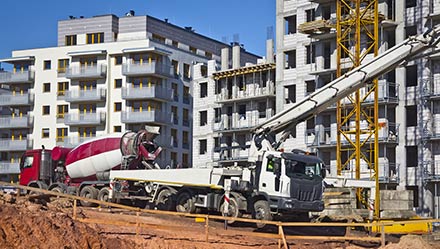Efficient concrete production in Morocco saves 240 thousand litres of diesel per year

Investor
SME construction company

Location
Casablanca, Morocco

Investment
Concrete pump on Euro 5 truck

Investment Size
€ 364,000

Energy savings
2,428 MWh per year

Resource savings
240,000 litres of diesel per year

CO2 savings
50% or 649 tonnes of CO2 emissions per year

Impact
Better accessibility to sites

Donor
EU NIF, SEMED Multi-Donor Account

New concrete pump improves the production process and increases efficiency
SBTH is a construction company operating in the commercial and residential sectors. With strong demand in the construction sector and increased competition, the company saw a need to increase its competitiveness by investing in modernization of its construction equipment.
The company addressed MorSEFF for financing of a project on purchase of a concrete pump mounted on a Euro 5 truck.
The MorSEFF team performed the analysis of the proposed technology, its potential of energy saving, financial-technical parameters and profitability.
Currently, the company transports cement to the construction sites by a crane. This method is costly, slow and limited to sites accessible by a crane and not traffic congested. The crane is continuously fed by the stand-alone generator that consumes two litres of diesel to produce one cubic metre of concrete. The new pump will consume only one litre of diesel per cubic meter of product, generating 50 per cent energy savings.
The €364,000 investment allows SBTH to reduce by half its energy consumption, namely by 240,000 litres of diesel per year, leading to substantial cost savings. In addition, the new machine can be used in remote sites, increasing the company’s accessibility and business. The investment will be repaid out of energy savings very fast, immediately increasing the company’s margins and profits.
This project demonstrates that investments in energy efficiency are profitable, lead to additional benefits, enhance company’s competitiveness and go hand in hand with positive environmental impact, as the company reduces by 50 per cent its CO2 emissions.
The EBRD through MorSEFF supports the sustainable financing and implementation of energy efficiency and renewable energy projects by the private sector. Together, the private, residential, and public sectors can make a change in the energy consumption patterns and contribute to environmental protection.
This project is funded by the EU and the EBRD’s Southern and eastern Mediterranean (SEMED) Multi-Donor Account. The donors of the SEMED MDA are: Australia, Finland, France, Germany, Italy, the Netherlands, Norway, Sweden, Taipei China and the United Kingdom.



